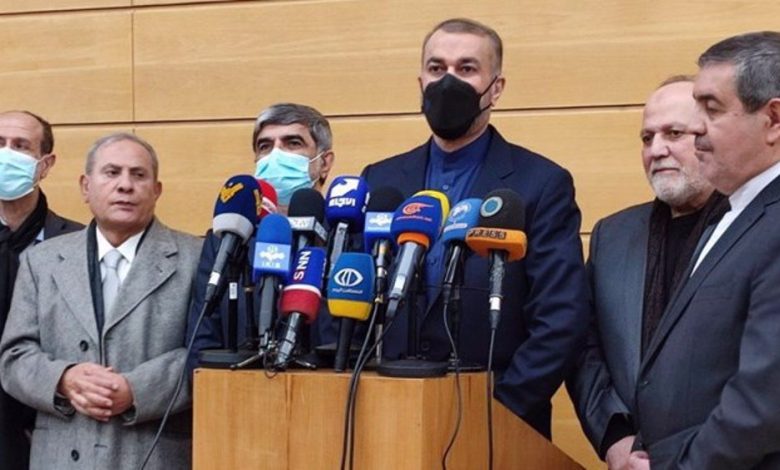
Foreign Minister Hossein Amir-Abdollahian says Iran is ready for a good, strong and lasting agreement in Vienna, but not at the expense of crossing its red lines.
Marathon talks in the Austrian capital are reportedly down to negotiating the footnotes of an agreement, but a state of flux in Washington on recommitting the US to the 2015 nuclear agreement and undoing its wrongs against Tehran is bedeviling the efforts.
“We believe that instead playing for time and with words and wasting time, the American side should take the right path and act pragmatically,” Amir-Abdollahian said at a news conference in Beirut Thursday, adding that the vital issue of the removal of sanctions on Iran is not fully resolved yet.
“We are ready for a good, strong and stable agreement, but not at the price of our red lines,” he said. “If the United States is pragmatic, a deal can be reached in the short term,” he added.
White House national security adviser Jake Sullivan said on Wednesday the United States and its allies have made progress in Vienna talks but issues remain, and it is unclear if they will be resolved.
The negotiations began last April between Britain, China, France, Germany, Iran and Russia. Last week, The Wall Street Journal wrote that the final hurdle to reviving the deal is lifting terrorism sanctions on the Islamic Revolution Guards Corps (IRGC). The issue, it said, was galvanizing opposition to the deal in Washington and among Middle Eastern allies such as Israel.
Amir-Abdollahian arrived in Beirut to discuss issues of mutual interest as well as unfolding developments in the Middle East region with senior Lebanese authorities.
Heading a high-ranking diplomatic delegation, the top Iranian diplomat arrived from Damascus as part of a regional tour that includes high-profile meetings.
According to Lebanon’s official National News Agency, Amir-Abdollahian was due to meet President Michel Aoun, Parliament Speaker Nabih Berri, Prime Minister Najib Mikati, his Lebanese counterpart Abdallah Bou Habib as well as a number of political figures during his visit.
“We are in Beirut because the relationship between Iran and Lebanon is excellent. We have regular and constructive consultations with Lebanese officials on bilateral, regional and international issues,” he told reporters upon arrival at Beirut airport.
“From my last trip to Beirut up until now, many regional and international developments have taken place. It is, therefore, necessary to have more detailed consultations with dear Lebanese officials, given the resolve that exists both in the Islamic Republic of Iran and Lebanon.”
Amir-Abdollahian said, “We declare once again that we are ready to continue our support and important trade and economic cooperation with Lebanon.”
He said that during a meeting with Mikati on the sidelines of the 58th Munich Security Conference a month ago, he informed the Lebanese premier of Iran’s readiness to establish two 1,000-megawatt power stations in Lebanon and to fully develop trade and economic cooperation with the country.
“The Islamic Republic of Iran has proved that it will stay with its friends in difficult days. We have made other proposals to work with Lebanon to overcome the current difficult economic situation, which will be discussed by senior Lebanese officials.”
He also praised the Lebanese resistance and reiterated Iran’s support for the political process in Lebanon which will hold a parliamentary election on May 15.
“The name of Lebanon is tied to the resistance. If it were not for the Lebanese resistance and the Lebanese people, Beirut would be under the boots of the occupiers of the fake Israeli regime today.
“If it were not for the resistance and the defenders of holy shrines in the region, Daesh would be present in our region today and the region would take a different shape.”
Amir-Abdollahian said elections are a clear example of strong democracy in Lebanon. “We are confident that with the wisdom of the Lebanese leaders and the role of the Lebanese people, there will be wholly successful elections to mark a bright future for Lebanon.”
Later on Thursday, Iran’s top diplomat met with a number of high-profile officials from Palestinian resistance movements, including Islamic Jihad leader Ziyad al-Nakhalah and senior Hamas official Mousa Mohammed Abu Marzook, at the Iranian embassy in Beirut.







